Church

What does it look like for churches to act faithfully in the current tumultuous political crisis? Prophetic witness and speaking up for justice matters; acting faithfully goes hand in hand with speaking faithfully. Whatever policy priorities churches focus on, they should always look to go deeper into solidarity with those in need in their communities — especially marginalized people who are in danger due to unjust government actions.
Solidarity isn’t affection. Solidarity is, instead, a recognition that our destinies are intertwined because of our common humanity. As Martin Luther King, Jr. wrote in his 1963 “Letter from Birmingham Jail,” “We are caught in an inescapable network of mutuality, tied in a single garment of destiny.”

Within hours of coming into office, President Donald Trump rescinded a 14-year policy prohibiting Immigration and Customs Enforcement officers from arresting migrants near “sensitive locations,” including schools, hospitals, and places of worship. Here’s how church leaders responded
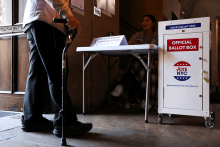
During the 2024 August primary election, a Detroit man called the Election Protection Hotline to report an accessibility issue at a polling location. The man, who had a mobility disability, went to vote at a church in the city where he was met with a flight of stairs but no ramp. He was forced to get out of his wheelchair and climb the stairs on his hands and knees before he could cast his vote.
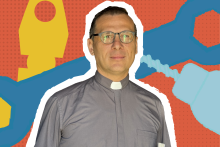
When I visited Rev. Munther Isaac in Bethlehem, the West Bank, in October, he mentioned that he was previously opposed to liberation theologian James H. Cone. Isaac was trained in theologically conservative teachings, growing up in a conservative church and then leaving Palestine to attend a conservative seminary in the U.S.
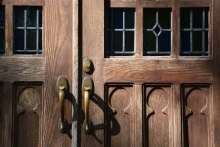
Rev. Jes Kast started planning for the Sunday after the election in midsummer, before her three-month sabbatical. She’d timed her leave intentionally, wanting to return to her congregation well-rested, right before one of most contentious elections in U.S. history. “I had a sense in my spirit that this next phase in ministering, whatever the outcome of the election, would require me to be as spiritually grounded as possible,” said Kast, who pastors Faith United Church of Christ in State College, Pa.

I was listening to BBC’s Focus on Africa this summer when I first heard Dausab interviewed about his role in the landmark court case to overturn Namibia’s anti-LGBTQ+ legislation. In a throw-away line, the host indicated that Dausab was a Christian — and Dausab didn’t equivocate.
“As a born-again Christian, I always go back to Jesus …,” Dausab told the host.
Who was this born-again Christian that brought down Namibia’s sodomy laws? I wanted to meet this guy.
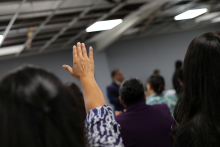
Walking into Iglesia La Gloria de Dios Internacional, a Latino Pentecostal church in the heart of Hialeah, Fla., I felt nervous to be on church grounds. I’m Mexican American, but I don’t speak Spanish; I’m an autistic person who really doesn’t like new situations. And even though it’s now been a year since I moved back home to Miami from Minnesota, I am still a bit self-conscious of my Midwestern accent. But most importantly, I am an atheist and an openly queer and trans person living in Florida.
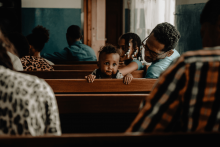
I asked my 3-year-old niece, Ember, what she learned in church. She said she learned about Jesus. “Who is Jesus,” I asked. “Where does he live?” She looked at me like I was an idiot, and then said, “Jesus is in our heart. Jesus helps us not be scared and not be afraid.”

For more than a year, Riverton Park United Methodist Church in Tukwila, Wash., has been a cramped, uncomfortable shelter for hundreds of refugees. Neither designed nor intended to be a camp for those navigating the complicated immigration and asylum process, the ongoing situation has become a crisis, with the city declaring a state of emergency last October. Still, as Riverton Park remains unwilling to turn people away, the church and its neighbors, community organizers, and local government are all seeking solutions to the crisis.
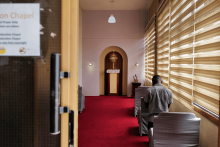
In a country where religious leaders openly condemn homosexuality and gay sex is punishable with jail time, Ghanaian couple Kay and Naa Shika fear more for their lives and safety than whether a church will bless their same-sex union.
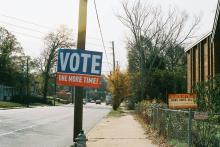
It’s an election year again, and so far it sees that President Joe Biden and former President Donald J. Trump will again be on the ballot for the White House in 2024. For many churches, that means a repeat of 2020’s division, misinformation, and difficult decisions about corporate worship.
Buckle up.
We have been on this ride before, but that doesn’t mean it will be any easier.

Tran won’t settle for simply critiquing racial capitalism or popular anti-racist enterprises that steer clear of economics. Tran believes that Christian theology offers an alternative story to the economy of racial capitalism, an alternative that finds its locus in what he describes as the “divine economy.”
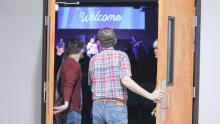
In July, Ryan Burge, an associate professor of political science at Eastern Illinois University and an ordained minister in the American Baptist Church, made a case on his Substack that, with the exception of the rise of those who identify as non-religious or “nones,” the most important trend in American religiosity is the rise of nondenominational churches. For those who are actively engaged in denominational life, the numbers are staggering.
When taken together, those attending nondenominational churches now make up the second largest religious group in the United States after Roman Catholics. Rising from a mere 5 percent of the U.S. religious landscape in 1984, nondenominational adherents are now estimated to represent an astonishing 22 percent.

The arrival of a child into a religious community usually sets off a flurry of activity. Someone usually organizes a meal delivery. A pastor might visit the hospital. Older parents often reach out with words of advice to the younger, sleep-deprived new parents. But when that child is born with a severe or chronic medical condition, families need more than the church can give, said Matt Steinhauer, a retired minister with the Evangelical Lutheran Church in America, former insurance broker, and the parent of a son with Down syndrome.

In May, Surgeon General Dr. Vivek Murthy declared social isolation to be a U.S. public health crisis for its link to depression in youth and increased risks for many health conditions in older Americans.
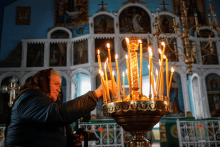
As a crowd gathered outside the white-brick Orthodox church in the village of Karyshkiv in western Ukraine, raised voices quickly turned to shouting. Soon old women were crying. The villagers were quarrelling over the affiliation of their parish church, which belonged to the Ukrainian Orthodox Church (UOC) that the government in Kyiv accuses of being under the influence of Moscow.

On Mother’s Day in many congregations across the U.S., churches will hand out flowers, host breakfast and tea, or offer applause for women in attendance. While the goal is to honor women and mothers, Elizabeth Hagan, a minister at Georgia’s First Christian Church Athens and author of Birthed: Finding Grace Through Infertility, told Sojourners that the celebrations can cause discomfort, pain, or even disillusionment for many in the pews.

It would appear that most people raised in the church do not, in fact, stay in the church.
In recent years, there’s been an uncomfortable shift in how the topics of marriage and families are being framed. Rather than simply acknowledging marriage and family as moral goods, children and families are frequently put forward as the solution for preserving Christianity amidst its perceived cultural decline.

Nearly 30 groups of Catholic nuns, totaling more than 6,000 people across 18 states, signed onto a statement celebrating Trans Day of Visibility and calling people to resist anti-transgender legislation in their states.
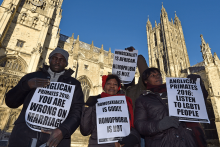
The Church of England will refuse to allow same-sex couples to get married in its churches under proposals set out on Wednesday in which the centuries-old institution said it would stick to its teaching that marriage is between a man and a woman.